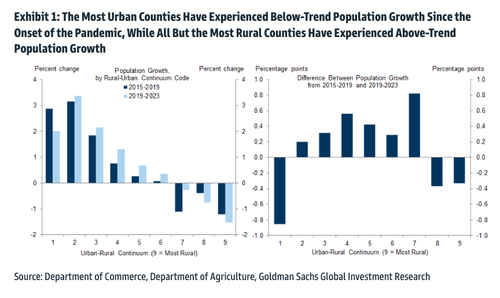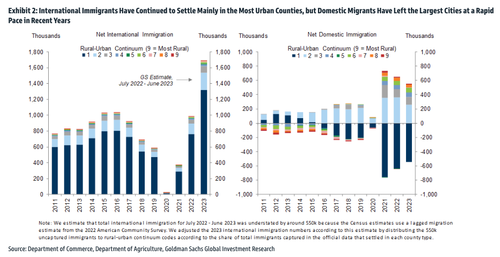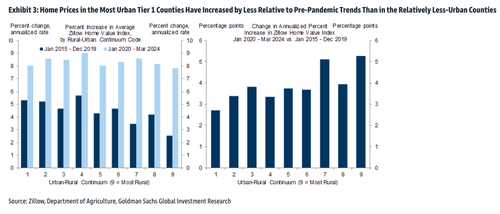
A team of Goldman analysts led by Jan Hatzius found that domestic migration trends from big cities continued through mid-2023. This trend, initially sparked by virus fears and remote working, was further fueled by rising violent crime in urban areas. People sought peace and quiet, moving to suburbia and rural areas for more land and larger homes.
"The recent surge in immigration into the US is now well known. But newly released county-level population estimates from the Census reveal another major migration trend: domestic emigration from large cities," Hatzius told clients on Wednesday.
Goldamn's chief economist said - that most cities - with populations over a million - "experienced population growth nearly 1% below the pre-pandemic trend over 2019-2023 cumulatively, while all but the most rural counties experienced above-trend population growth."
Here's more color on the findings:
First, the most urban Tier 1 counties, which include cities such as Kansas City, New Orleans, and Cleveland, experienced population growth nearly 1pp below the pre-pandemic trend over 2019-2023 cumulatively, while counties in Tiers 2-7, which include cities such as Ann Arbor in Tier 2, Santa Fe in Tier 3, and Juneau in Tier 5, experienced population growth 0.4pp above the pre-pandemic trends on average over that period (Exhibit 1).
The rise of remote and hybrid work arrangements made it easier for workers to relocate away from offices that might have tied them to city centers prior to the pandemic. We noted previously that the share of US workers working from home at least part of the week peaked at 47% at the height of the pandemic and has now stabilized at around 20-25%, well above the pre-pandemic average of 2-3%.
Hatzius' team also revealed that government county-level population data showed domestic migrants were leaving big cities in droves (about 750k in 2021, 650k in 2022, and 550k in 2023). More than half of them moved to areas between 250k to 1 million. This outflow comes as the Biden administration facilitated the greatest illegal alien invasion this nation has ever seen, piling migrants into crime-ridden progressive cities.
Given the strong positive population trends outside large cities, Hatzius' team determined housing markets were hotter in suburbia:
"Stronger population growth outside the Tier 1 counties has meant somewhat faster house price appreciation relative to pre-pandemic trends compared to the Tier 1 counties."
The bad news is that housing prices in suburbia are unlikely to return to pre-Covid levels.
A team of Goldman analysts led by Jan Hatzius found that domestic migration trends from big cities continued through mid-2023. This trend, initially sparked by virus fears and remote working, was further fueled by rising violent crime in urban areas. People sought peace and quiet, moving to suburbia and rural areas for more land and larger homes.
“The recent surge in immigration into the US is now well known. But newly released county-level population estimates from the Census reveal another major migration trend: domestic emigration from large cities,” Hatzius told clients on Wednesday.
Goldamn’s chief economist said – that most cities – with populations over a million – “experienced population growth nearly 1% below the pre-pandemic trend over 2019-2023 cumulatively, while all but the most rural counties experienced above-trend population growth.”
Here’s more color on the findings:
First, the most urban Tier 1 counties, which include cities such as Kansas City, New Orleans, and Cleveland, experienced population growth nearly 1pp below the pre-pandemic trend over 2019-2023 cumulatively, while counties in Tiers 2-7, which include cities such as Ann Arbor in Tier 2, Santa Fe in Tier 3, and Juneau in Tier 5, experienced population growth 0.4pp above the pre-pandemic trends on average over that period (Exhibit 1).
The rise of remote and hybrid work arrangements made it easier for workers to relocate away from offices that might have tied them to city centers prior to the pandemic. We noted previously that the share of US workers working from home at least part of the week peaked at 47% at the height of the pandemic and has now stabilized at around 20-25%, well above the pre-pandemic average of 2-3%.
Hatzius’ team also revealed that government county-level population data showed domestic migrants were leaving big cities in droves (about 750k in 2021, 650k in 2022, and 550k in 2023). More than half of them moved to areas between 250k to 1 million. This outflow comes as the Biden administration facilitated the greatest illegal alien invasion this nation has ever seen, piling migrants into crime-ridden progressive cities.
Given the strong positive population trends outside large cities, Hatzius’ team determined housing markets were hotter in suburbia:
“Stronger population growth outside the Tier 1 counties has meant somewhat faster house price appreciation relative to pre-pandemic trends compared to the Tier 1 counties.”
The bad news is that housing prices in suburbia are unlikely to return to pre-Covid levels.
Loading…







